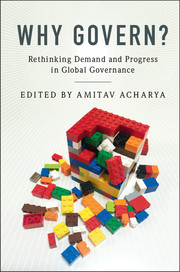1 - Rethinking Demand, Purpose and Progress in Global Governance: An Introduction
Published online by Cambridge University Press: 05 September 2016
Summary
Global governance is one of the most important and contested issues in international relations scholarship and policy making today. With intensified globalization and the proliferation of collective action problems in diverse areas such as security, climate, human rights, refugees, health, economic relations and cyberspace, the need for global governance is ever more acknowledged. Yet there is also growing uncertainty and doubt about its future. While there is a tendency among policymakers to think of global governance as a “good thing,” the rationale for and progress of global governance are marked by uncertainty. The spread of the institutions and forms of global governance is remarkably different across issue areas. Debates and controversies abound over the reform of existing institutions of global governance and the creation of new ones.
Adding to the uncertainty is the fact that the architecture of global governance erected after World War II is now under considerable stress. That architecture was built around the United Nations (UN) system of multilateral institutions, which were in turn considered to be the foundations of a liberal international order reflecting, at least initially, the power and purpose of the United States. As the issue areas requiring transnational response have proliferated, the number of actors demanding greater space within the global governance system have also multiplied. Among them are the rising powers, like China, India and Brazil, who seek greater voice and influence in the existing institutions and are prepared to erect new ones when their demands are frustrated. But the rising powers are hardly alone. Other players in global governance include civil society networks, corporations, private foundations, regional organizations, and various types of partnership among them.
Hence, it is not surprising that a good deal of the recent work on global governance has focused on the proliferation of actors and its changing architecture. This has led to a more sophisticated and nuanced understanding of global governance than the earlier literature that focused on large international institutions. But the emphasis on “who governs” obscures the question of “why govern.” The focus on the supply side of global governance, such as its institutions and actors, old and new, state and non-state, and the myriad forms of their modus operandi, often takes the demand for global governance for granted, and neglects the more fundamental question about why global governance is needed in the first place and what are the sources generating that need.
Information
- Type
- Chapter
- Information
- Why Govern?Rethinking Demand and Progress in Global Governance, pp. 1 - 28Publisher: Cambridge University PressPrint publication year: 2016
Accessibility standard: Unknown
- 8
- Cited by
